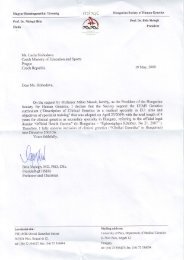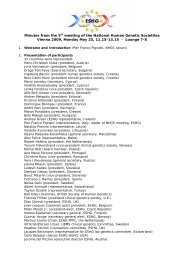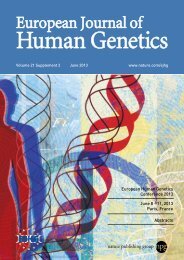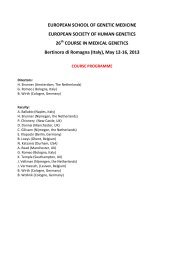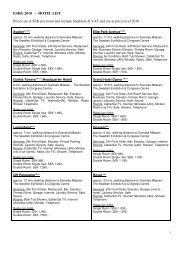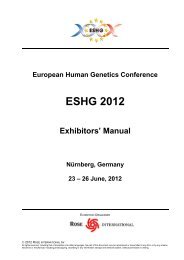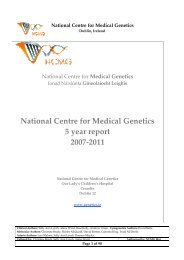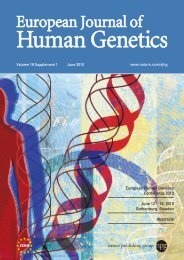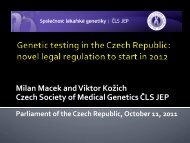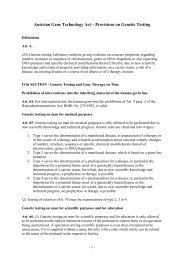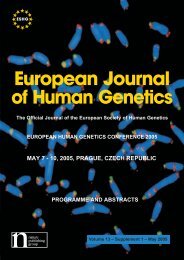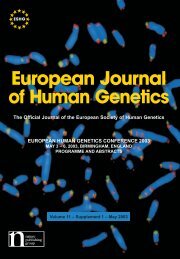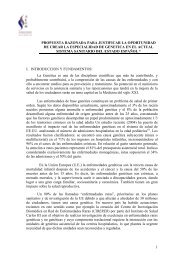2008 Barcelona - European Society of Human Genetics
2008 Barcelona - European Society of Human Genetics
2008 Barcelona - European Society of Human Genetics
Create successful ePaper yourself
Turn your PDF publications into a flip-book with our unique Google optimized e-Paper software.
EMPAG Workshops<br />
Methods The matrix measures 11 recognised stressors and 8 specific<br />
coping strategies for individuals undergoing cancer genetic risk assessment,<br />
identified through previous research. The matrix was piloted<br />
within a psychological questionnaire as part <strong>of</strong> a randomised trial <strong>of</strong><br />
a coping intervention (CARIAD) .<br />
Findings Preliminary analyses revealed that 134 <strong>of</strong> the 139 respondents<br />
completed the matrix, with the current data reported from the<br />
first 50 participants. Of the three most frequently endorsed stressors,<br />
60% <strong>of</strong> respondents were quite a bit/very worried about how family<br />
members would react if found to be at increased risk, and primarily<br />
made use <strong>of</strong> social support; 54% were quite a bit/very worried about<br />
how they would cope if found to be at increased risk and primarily<br />
coped through positive appraisal; and 48% were quite a bit/very worried<br />
about having to wait to find out their own risk and coped mainly<br />
through acceptance .<br />
Discussion Participants reacted in different ways to different stressors,<br />
although emotion-focused strategies were the most common overall .<br />
The completion rates for the matrix and specificity <strong>of</strong> responses provided<br />
suggests this coping matrix may be an acceptable measurement<br />
tool . Further data collection and validation is ongoing .<br />
EMPAG WORKSHOPS<br />
EW1.1<br />
talking about disability in prenatal genetic counselling<br />
sessions: identifying tensions and developing strategies<br />
J. M. Hodgson1 , J. Weil2 ;<br />
1 2 Murdoch Childrens Research Institute, Melbourne, Australia, University <strong>of</strong><br />
California, San Francisco, CA, United States.<br />
To facilitate informed decision-making in prenatal genetic counselling<br />
it is essential that counselees and counsellors engage in a process<br />
that provides:<br />
a) relevant information concerning the nature <strong>of</strong> genetic conditions<br />
b) an opportunity for counselees to consider parenting a child with a<br />
disability<br />
This workshop will provide an opportunity for participants to reflect on<br />
the sensitivities inherent in such discussions and participate in developing<br />
strategies for best practice in addressing these complex issues .<br />
Academic literature and an ethical analysis <strong>of</strong> the goals <strong>of</strong> prenatal<br />
genetic counselling will be presented to demonstrate that facilitation <strong>of</strong><br />
informed decision-making is an ethically appropriate goal <strong>of</strong> prenatal<br />
genetic counselling . Data from an Australian research project and the<br />
results <strong>of</strong> an interactive workshop at the 2007 NSGC Convention will<br />
provide further evidence <strong>of</strong> the need for more effective communication<br />
about disability in prenatal genetic counselling and identify complexities<br />
and impediments involved in doing so . Preliminary suggestions for<br />
addressing these issues will be presented .<br />
A small group format will then be used in which participants will discuss<br />
and reflect on their experiences <strong>of</strong> communicating about disability,<br />
identify specific tensions and concerns associated with such dialogue,<br />
and develop strategies to promote effective and ethically appropriate<br />
discourse between counselees and counsellors . Written outlines from<br />
the groups will be used to develop a preliminary summary and synthesis,<br />
with further participant discussion . It is anticipated that this workshop<br />
will provide valuable information that can be complemented by<br />
input from consumer groups and other stakeholders .<br />
EW2.1<br />
Assessing Quality <strong>of</strong> counselling in the context <strong>of</strong> Genetic<br />
testing Workshop<br />
H. Skirton 1 , H. Kaariainen 2 , E. Rantanen 3 , M. Hietala 3 , J. Sequeiros 4 , U. Krist<strong>of</strong>fersson<br />
5 , L. Kerzin-Storrar 6 , A. Tibben 7 , G. Evers-Keibooms 8 , A. Faucett 9 , A.<br />
Clarke 10 ;<br />
1 Faculty <strong>of</strong> Health and Social Work, University <strong>of</strong> Plymouth, Taunton, United<br />
Kingdom, 2 National Public Health Institute, Helsinki, Finland, 3 Department <strong>of</strong><br />
Medical <strong>Genetics</strong>, University <strong>of</strong> Turku, Turku, Finland, 4 IBMC, University <strong>of</strong><br />
Porto, Porto, Portugal, 5 Department <strong>of</strong> Clinical <strong>Genetics</strong>, University Hospital,<br />
Lund, Sweden, 6 Regional <strong>Genetics</strong> Service & Medical <strong>Genetics</strong> Research<br />
Group, CMMC & University <strong>of</strong> Manchester, Manchester, United Kingdom, 7 Centre<br />
for <strong>Human</strong> and Clinical <strong>Genetics</strong>, Leiden University Medical Centre, Leiden,<br />
The Netherlands, 8 Centre for <strong>Human</strong> <strong>Genetics</strong>, University <strong>of</strong> Leuven, Leuven,<br />
Belgium, 9 Emory University School <strong>of</strong> Medicine, Atlanta, GA, United States,<br />
10 Institute <strong>of</strong> Medical <strong>Genetics</strong>, Cardiff University, Cardiff, United Kingdom.<br />
The EuroGentest network is a 5 year collaboration between many <strong>European</strong><br />
experts, the aim <strong>of</strong> the which is to harmonise and standardise<br />
genetic testing in Europe . In Unit 3, counselling issues have been the<br />
focus . Recommendations have been made about the need for certain<br />
types <strong>of</strong> genetic testing (e .g . prenatal, predictive) to be accompanied<br />
by appropriate genetic counselling, as well as psychosocial support in<br />
some instances, to safeguard those being tested . However, if genetic<br />
healthcare is to be evaluated or audited, appropriate standards and<br />
measurable outcomes need to be defined.<br />
Assessing the outcomes <strong>of</strong> genetic counselling has long been a challenge<br />
to those in the field. Many outcomes (e.g. altered sense <strong>of</strong> control,<br />
peace <strong>of</strong> mind, ability to plan for the future) are difficult to measure<br />
. In addition, the structure <strong>of</strong> health services differs greatly across<br />
<strong>European</strong> countries . The Expert Group <strong>of</strong> Unit 3 has devised an assessment<br />
tool, setting standards and potential measurable outcomes<br />
for genetic counselling . The standards address aspects <strong>of</strong> the service<br />
including access to peer support and continuing pr<strong>of</strong>essional education,<br />
supervision <strong>of</strong> junior staff, waiting times, physical clinical environment<br />
and communication with counsellees . A set <strong>of</strong> measures that can<br />
be applied across different systems <strong>of</strong> healthcare has been drafted .<br />
In this workshop, we will present work already undertaken, but the<br />
main aim will be to engender discussion and to use the feedback and<br />
ideas generated to further develop a set <strong>of</strong> assessment tools that will<br />
be applicable to genetic counselling services in the <strong>European</strong> context .<br />
EW3.1<br />
Workshop: Genetic counseling and predictive testing: A<br />
dynamic perspective<br />
A. Tibben 1,2 , L. H<strong>of</strong>fman 3 ;<br />
1 Leiden University Medical Centre, Leiden, The Netherlands, 2 Erasmus Medical<br />
Centre Rotterdam, Rotterdam, The Netherlands, 3 Department <strong>of</strong> Oncology,<br />
Faculty <strong>of</strong> Medicine, McGill University, Montreal, QC, Canada.<br />
Genetic counseling aims to allow counselees to make informed decisions<br />
and act accordingly . In this workshop we wish to explore how<br />
genetic counseling and the procedure <strong>of</strong> predictive testing can benefit<br />
from both psychodynamic and family therapy theory and practice.<br />
First, psychodynamic theory and its application in genetic counseling<br />
will be clarified using four models: the developmental, object-relationship,<br />
the self-psychology and the drive model . Second the relevance<br />
<strong>of</strong> and application <strong>of</strong> structural family therapy theory will be described .<br />
Third, elaboration <strong>of</strong> two clinical cases will show the usefulness <strong>of</strong><br />
these theories . Finally, we will explore the requirements <strong>of</strong> training and<br />
education, in both psychodynamic and structural family theory and<br />
practice, in genetic counseling . Participants are invited to bring their<br />
own cases .<br />
EW4.1<br />
Analysing the social dimensions <strong>of</strong> coping in families: a<br />
workshop on presenting the results in clinical practice<br />
H. G. Van Spijker, T. Brouwer;<br />
Medical <strong>Genetics</strong> University Medical Centre, 3508 CA Utrecht, The Netherlands.<br />
Coping is commonly viewed as an individual stress response, but it<br />
has also a social dimension . How do people experience stress in social<br />
groups, like families? How do they engage together in actions to<br />
deal with a stressor, like a genetic disease? In clinical practice, obtaining<br />
a family history is an essential skill for genetic counsellors . It provides<br />
a basis for making a diagnosis, determining risk, and assessing<br />
the needs for patient education and psychosocial support . Valuable<br />
psychosocial information can be obtained in parallel with medical-genetic<br />
information . The family pedigree however does not show data on<br />
social interactions within the family, although ‘the process [<strong>of</strong> gathering<br />
family data] frequently induces a thoughtful frame <strong>of</strong> mind that is both<br />
inward- and outward-looking regarding family members and family dynamics’<br />
. (Weil, Psychosocial genetic counseling, 2000) .<br />
In this workshop, we start with an introduction <strong>of</strong> a conceptual model<br />
on social dimensions <strong>of</strong> coping, illustrated by data from a family questionnaire<br />
we used in a study on coping strategies . Next, we present<br />
some tools by which the information about social interactions within a<br />
family visually and conceptually can be organized . These tools can be<br />
helpful in analysing the dynamics <strong>of</strong> a family: kin and nonkin relationships,<br />
communication patterns, social roles and messages . In this way



